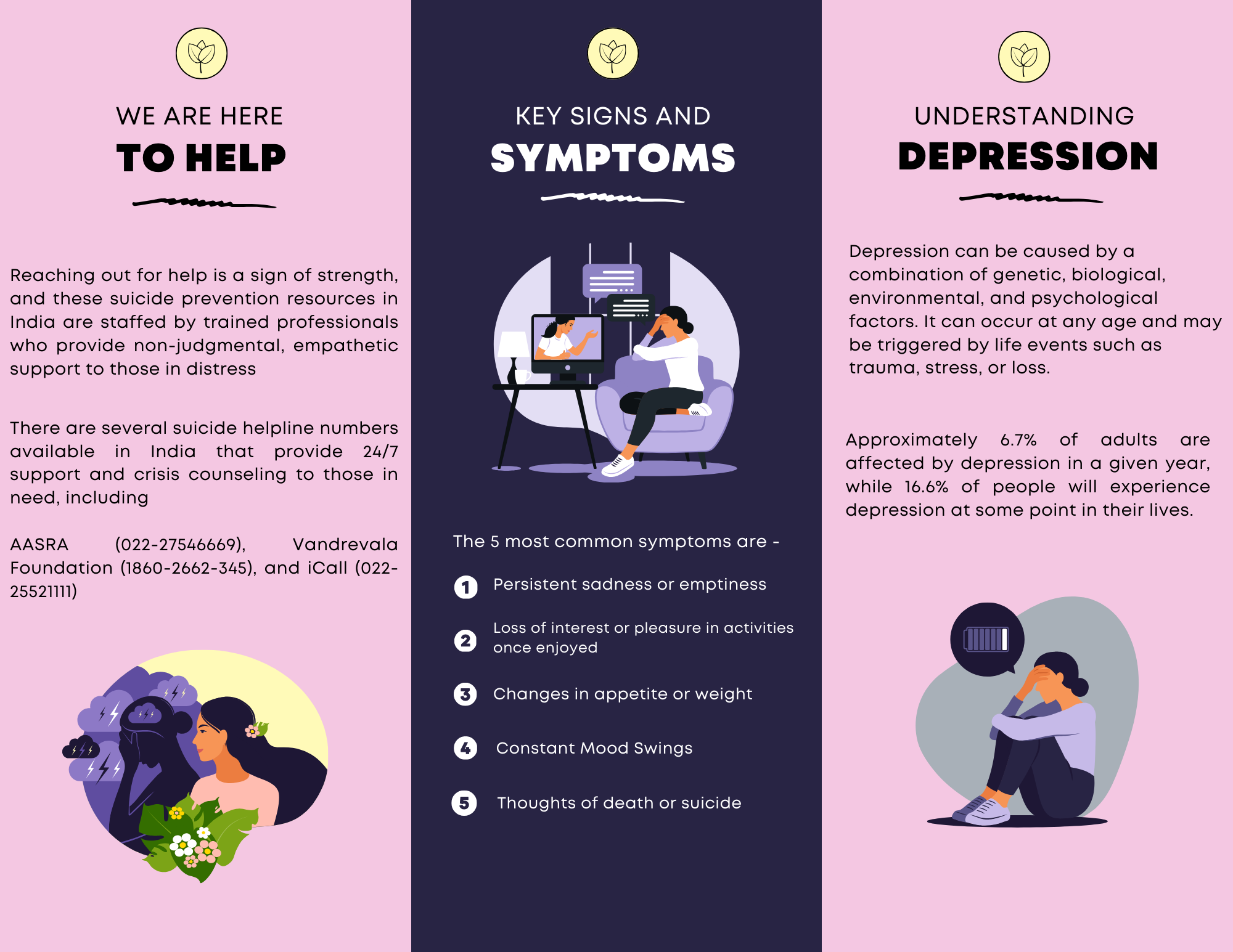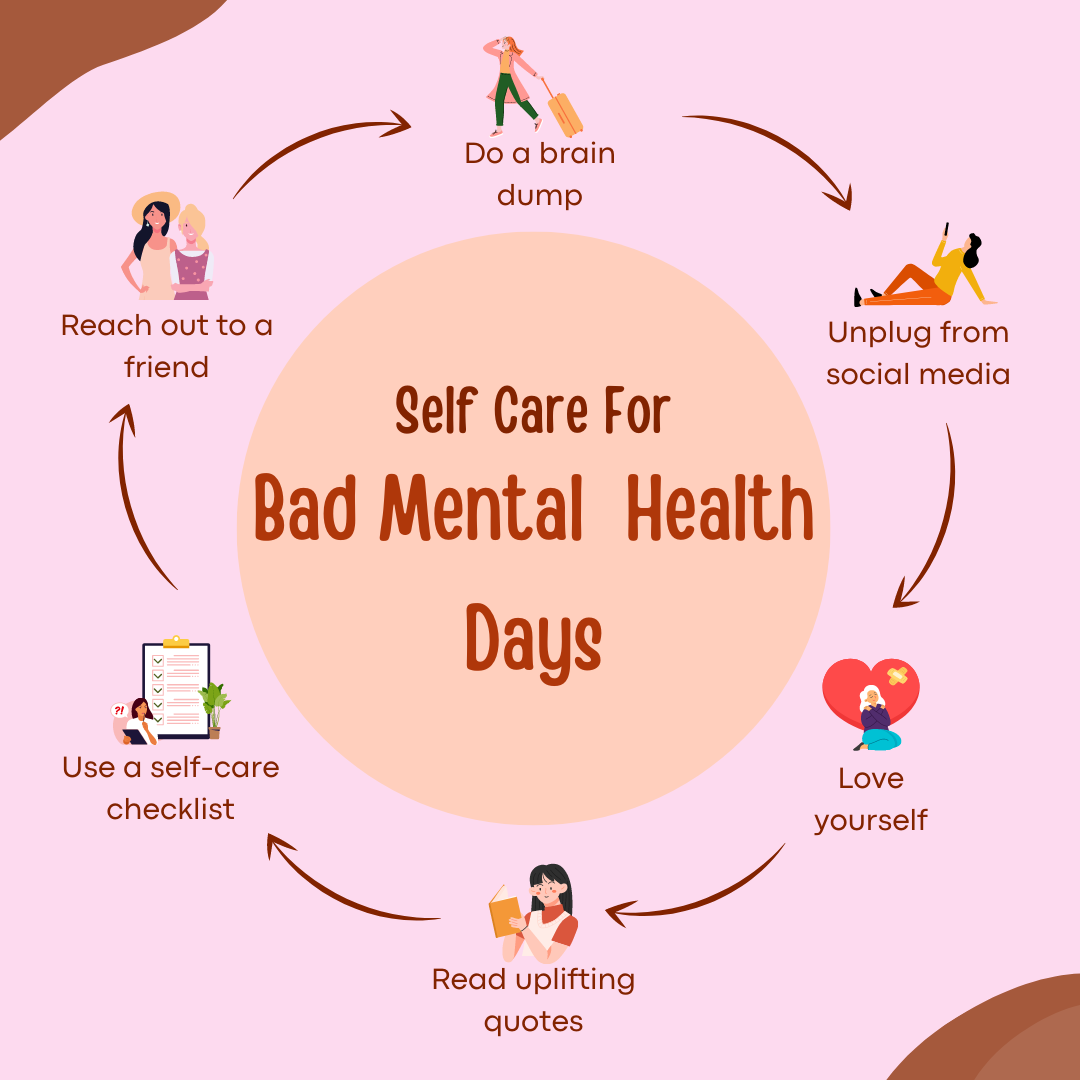When talking to an individual battling depression, it may be difficult to know what to say. You may be nervous about making a mistake with your words. Or, is it possible that something you say could make their day even more miserable? It may be best to steer clear of the person while recovering from their illness.
Depression is a common and serious mood disorder that can negatively affect how you feel, think, and act. It causes feelings of sadness, loss of interest in activities once enjoyed, and a range of emotional and physical problems.
Helpline Numbers For Mental Health Issues
Vandrevala Foundation Helpline: 1-860-266-2345
This helpline offers emotional support and crisis intervention for those experiencing mental health issues.
Snehi: +91-22-24131212
Snehi offers emotional support and counseling to individuals in distress, including those contemplating suicide.
Aasra: +91-9820466726
Aasra provides support to individuals in distress, including those experiencing suicidal thoughts. They offer counseling and emotional support.
Samaritans Mumbai: +91-8422984528, +91-8422984529, +91-8422984530
Samaritans Mumbai offers emotional support to those in distress, including individuals considering suicide. They provide non-judgmental listening and support.
Sahai: 080-25497777
Sahai offers emotional support and counseling to individuals in distress, including those struggling with suicidal thoughts.
However, many people with depression have experienced feeling isolated, and this mental state only serves to make their depressive episodes worse. We have compiled a list of communication ideas to assist you in having productive conversations with family members or coworkers who wish to tackle depression.
Depression is characterized by an overwhelming sense of melancholy that lasts for at least two weeks in a row and a loss of interest in previously pleasurable activities. Other symptoms include:
- A reduction in body mass or a change in appetite.
- A sensation of worthlessness or guilt.
- A lower capacity for thought and concentration.
- The prevalence of suicidal ideas.
It is not a "life phase" that a person will grow out of as they would a terrible haircut or an old perm style.

What are the Common Symptoms of Depression?
- A depressed state of mind.
- A decrease or complete absence of pleasure in all of one's actions
- Changes in weight or appetite that are statistically significant
- Alterations to sleep Alterations to activity
- a feeling of exhaustion or a loss of energy
- Reduced capacity for concentration
- Negative emotions such as guilt and worthlessness
- Suicidal ideas or fantasies.

How is Depression Diagnosed?
Everyone experiences feelings of melancholy or depression from time to time. On the other hand, clinical depression is characterized by more severe symptoms that persist for at least two weeks.
Your healthcare professional will question you to identify whether or not you are suffering from clinical depression. You will be able to fill out a questionnaire & submit information about your family history. In addition, your healthcare professional may conduct an exam or order blood testing to determine whether or not you are suffering from another illness.

Causes of Depression in Students
Depression is common among college students, with one in four young adults between the ages of 18 and 24 being diagnosed with a mental disease. Depression in students may have increased feelings of isolation due to the pressures of college, yet they are not the only ones.
There is a growing awareness on the part of many educational institutions regarding how the numerous stresses of school increase the link between depression and college students. As a form of response, they provide initiatives that can assist pupils through this challenging period. Students often have access to mental health services through counseling from school personnel and other certified experts.
Unhealthy Patterns of Eating
Changing one's eating routine is among the most common occurrences that can take place. Many college students experience an initial shift toward a less healthful diet for various reasons, including convenience, lack of familiarity with cooking, stress, and access to food from cafeterias and takeout restaurants around the clock. In popular culture, this phenomenon is referred to as "putting on the freshman 15," It refers to the usual occurrence of weight gain in the freshman year of college due to improper dietary choices.
Fortuitously, this can also raise the likelihood that a person would struggle with depressive symptoms. Meals high in carbohydrates, high in sugar, and heavily processed, with such low nutritional quality and very few vitamins, increase the amount of brain inflammation even while depriving the body of the building blocks necessary to develop "feel-good" neurotransmitters like serotonin and dopamine. This can lead to various mental and physical health problems, including depression, anxiety, and addiction.
Changes in attention and an increase in anxiety can be brought on by ingesting substances like alcohol, nicotine, and caffeine, foods known to cause inflammation, as well as artificial colours and flavours.
Genetics/biology
It has been discovered that there is a genetic basis for depression and that depression tends to run in families. However, remember that just because there is a history of depressive disorders in an adolescent's family does not mean that the youngster will necessarily develop the condition themselves. Teens who do not come from families with a history of depression can develop the disorder.
Transitioning is not Easy to do
Moving to a different location and adjusting to its culture and the academic system can be a stressful and upsetting experience. Many teenagers may have a genetic predisposition toward developing depression; however, the symptoms of the condition don't typically show up until after an individual has been exposed to a large external stressor, like starting college.
The frontal lobe, which is responsible for higher-order order processing, including such a critical approach to decision-making, is still not fully formed in students; therefore, their decisions may not always be the best. Students may find themselves at their wits' end due to their transition to a new environment, the pressures of their coursework, and the poor choices they make due to their newly acquired independence.
Unnecessary Stress
Although a certain amount of stress may be unavoidable during one's time in college, the unfavourable effects of that stress may not necessarily have to be. Hormones associated with stress, such as cortisol and norepinephrine, are secreted by the body whenever it detects a situation that it deems dangerous, unsettling, or excessively demanding.
The body is gathering its strength and resources to evacuate us from danger. This is an excellent evolutionary survival mechanism, but the only problem is that the body can't recognize the difference between being stressed over running away from such a tiger and being stressed about such a final test. The body reacts the same way to both types of stress.
A stress response can be triggered in the body that activates the "fight-or-flight" mechanism if the individual is subjected to a significant amount of stress or sustained stress over an extended period. This response adds to a decline in the body's immunological system, disruption in blood sugar levels, poor digestion, decreased numbers of energy, anxiety, and sadness.
How to Treat Students with Depression?
Students are fickle-minded, and dealing with them is already hectic for every parent. On the worse side, students with depression are impossible to tackle since they refuse to open up with anyone. So, here are a few simple steps on how you can help your child with depression.
Let them Sleep
Lack of sleep makes it difficult to learn new things and can cause problems with one's memory, both of which can lead to certain other mental health difficulties. Getting enough sleep has a dramatic impact on one's mood as well as their overall health. College students can improve sleep quality by maintaining healthy sleep routines and engaging in frequent physical activity. Students who abstain from coffee and alcohol may also find that they have improved sleep quality.

Good Exercise is Important
Exercising your body regularly has several positive effects on your physical health, including making your heart stronger, lowering your blood pressure, reducing your body fat, and enhancing your strength. Research has demonstrated that regular physical activity has several positive effects on mental health, including alleviating stress and anxiety, especially depression.
Exercise has several positive effects on the brain, including enhanced memory and cognitive skills, which can benefit college students. Studies have demonstrated the advantages of physical activity for managing mild to moderate depression; however, despite this, many people do not take advantage of this treatment option. As a college student struggling with depression, it may be difficult to fathom how you could find the inspiration or the time to exercise.
Ensure they are Not Using Drugs & Alcohol
The culture of drinking and drug use on college campuses has become almost expected. At some schools, it isn't easy to have a social life because you are always surrounded by others who have one. Depression frequently accompanies alcohol and substance abuse, and vice versa.
People battling with depression often resort to substances like alcohol or drugs for relaxing, taking their minds off things, having some fun, or forgetting their problems. This is because depression can make it difficult to enjoy life. This can be extremely harmful to someone who is experiencing depression.
They must be made aware that, even though they may feel better momentarily, prolonged substance misuse will only serve to exacerbate the symptoms of depression.
How to Communicate with Someone with Depression?
How to communicate with someone with depression? There is a more fruitful method to consider the implications of this. My ability to listen has taught me that numerous " conversations " involve a wide variety of very diverse people who are all in some emotional suffering.

Listening-Talk
There are times when "saying" is not exactly what is required; rather, there are moments when all that is required of us is to "listen." We may refer to this type of interaction as "listening-talk," if you like. It is accurate to remark that "listening talk" is not the same as the typical type of conversation that we have. This discussion has the potential to be more thoughtful and considerate because of this communication. This "listening talk" is about hearing the anguish that others are experiencing and, at times, being there, "holding" or "holding on," at least for some time. The goal is cultivating a setting where we can constructively hear one another.
Ask How You Can Help Them
Because depression creates a significant load just on the individual suffering from it, both psychologically and physically, there are probably a lot of things you can do to help your friend recover while also easing some of the strain that depression places on them. Your friend may be hesitant to accept your offer out of concern that they will become a burden to you. If this is the case, you must make it abundantly obvious that you don't mind and want to assist in the same way you understand they would for you if you were in a similar situation.
Your acquaintance may be so worn out and discouraged due to their depression that they do not even understand what kind of assistance to ask for. This is another possibility.
Tell them “You are not to Blame”
Letting loved ones understand that they're not too responsible for their depression and informing them that they care about you demonstrates that depression is a medical condition, not a state of mind that can be chosen. Even though depression is not contagious in the same way that a cold is, many individuals who suffer from it believe they are to blame for it somehow. The release of blame and the beginning of the resolution of the burdensome feeling of guilt that they carry can be greatly assisted when you communicate your comprehension of this situation in a loving manner.
Is there any Cure at Home for Depression?
In this article, we will offer some straightforward treatments and adjustments to your lifestyle that you can use to alleviate the symptoms of depression on your own.
Do Yoga
Last but not least, please make an effort to practice yoga in all of its myriad forms. Get advice from a knowledgeable person at first, but after that, you should be able to complete the task independently at home. Asana, Pranayama as well as Meditation. Gain great benefits by bringing your mind, body, and spirit into alignment and centring yourself.
The best thing about treating depression with the help of yoga is that you can do it at home. All you will need is a guide to teach you yoga for depression. For this, you can consider Superprof.

Healthy Eating
Foods that are natural and have not been processed in any way are easily digested by the body and lead to feelings of bliss. This helps maintain an emotionally stable and balanced life while contributing to the body's overall excellent health. A daily diet that is healthy and balanced should consist primarily of pure sattvic foods. Your body will be better equipped to maintain its health if you eat a diet rich in whole grains, fresh produce and vegetables, lean sources of protein, and only moderate amounts of fat.
Reduce how much of certain types of foods you eat, including those that are processed, pre-prepared, preserved, fermented, tinned, packed, frozen, microwaved, fried, barbecued, heavy in sugar or spices, and those that include artificial flavours.
Express Yourself
Do not stuff your feelings; it is okay to laugh, cry, or even scream in the comfort of your own house. Let it all out. Talk about it and express how you're feeling to someone you can trust, like a member of your family, a close friend, or a coworker. Recognize and accept responsibility for the causes and triggers. Take part in social activities, even if you don't feel particularly compelled. Experiment with something new!
Do whatever helps you feel better, whether it's dancing, singing, painting, or cooking; these activities are both cathartic and calming. Watch comedies on television and in the movies!
Résumer avec l'IA :











